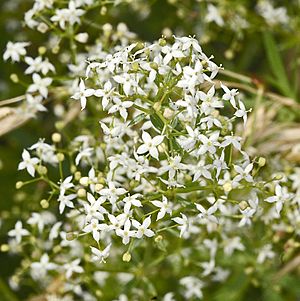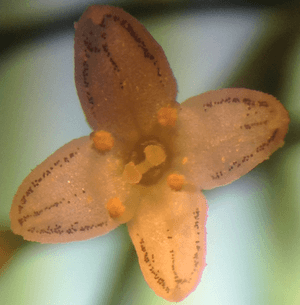Hedge bedstraw facts for kids
Galium mollugo, often called hedge bedstraw or false baby's breath, is a type of plant. It's a herb that lives for only one year, meaning it's an annual plant. It belongs to the Rubiaceae family, which is also known as the coffee family. Another plant, Galium album, also shares the name "hedge bedstraw."
Quick facts for kids Hedge bedstraw |
|
|---|---|
 |
|
 |
|
| Close up image of the Galium mollugo flower under a dissecting microscope | |
| Scientific classification |
|
| Kingdom: | Plantae |
| Clade: | Tracheophytes |
| Clade: | Angiosperms |
| Clade: | Eudicots |
| Clade: | Asterids |
| Order: | Gentianales |
| Family: | Rubiaceae |
| Genus: | Galium |
| Species: |
G. mollugo
|
| Binomial name | |
| Galium mollugo |
|
| Script error: The function "autoWithCaption" does not exist. | |
| Synonyms | |
|
|
Script error: No such module "Check for conflicting parameters".
Contents
What is Hedge Bedstraw?
Physical Features of the Plant
The hedge bedstraw plant, Galium mollugo, can grow to be between 15 and 100 centimeters tall. Its stems are shaped like a square when you look at them from the side. They usually stand upright with branches growing upwards.
Small white flowers grow from where the leaves meet the stem. Each flower is about 1 to 1.5 centimeters wide and has four petals. You can see these flowers blooming from May all the way through September.
Where Does Hedge Bedstraw Grow?
Natural Homes of the Plant
Galium mollugo likes to grow in many different places. You can often find it in hedges and among bushes. It also grows along paths, in open meadows, and on hillsides. This plant can live in areas up to 2,100 meters above sea level.
Where Can You Find Hedge Bedstraw?
Global Distribution of the Plant
Hedge bedstraw is found across a large part of the world. It grows widely in Europe and North Africa. Its range stretches from Denmark, Portugal, and Morocco in the west. It goes all the way east to the Altay region in Siberia and the Caucasus mountains.
Hedge Bedstraw in Other Countries
This plant has also spread to other parts of the world. It now grows naturally in the Russian Far East, New Zealand, and Norfolk Island. You can also find it in Greenland, Argentina, and Uruguay. In North America, it has spread across many areas.
It has been seen in the Rocky Mountains, the Cascade Range, the Sierra Nevada mountains, and the Appalachian Mountains. It also grows around the Great Lakes region. In some places, like New York, Pennsylvania, and much of New England, it is considered a "noxious weed." This means it's a plant that can cause harm, often to crops or natural areas.
See also
 In Spanish: Galium mollugo para niños
In Spanish: Galium mollugo para niños
 | Kyle Baker |
 | Joseph Yoakum |
 | Laura Wheeler Waring |
 | Henry Ossawa Tanner |

